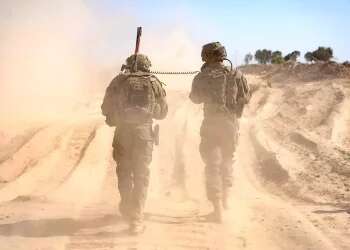The border with Egypt is deceptive. Presumably, this is a border of peace, but in practice, it is a complex battlefield, where threats of terrorism exist simultaneously, and sometimes combined, with the threats of crime.
Follow Israel Hayom on Facebook, Twitter, and Instagram
It is constantly emphasized to the soldiers who serve on this border that while there is indeed a friendly entity on the other side, beyond it there are active terrorist organizations that may initiate attacks at any given moment, as well as a plethora of organizations that survive on smuggling and the use violence to transport goods across the fence. Last year, hundreds of millions of shekels worth of drugs were seized on this stretch, which directly affected the incomes of the Bedouin tribes on both sides of the border and made them much more violent – including frequently using live fire against IDF soldiers. Such a smuggling operation was thwarted only a few hours before the Saturday attack, giving rise to the initial assessment that frustrated smugglers were the ones who attacked the soldiers.
But the sequel to the story taught otherwise. An Egyptian policeman who crossed the border killed the male and female combat soldiers and later managed to kill another soldier from close range before he was eliminated. The very fact that the policeman crossed the border is a serious blunder: There is a fence on the Egyptian border, built at a cost of billions, to prevent infiltrators from Africa from entering Israel, but later helped to stop terrorist attacks and smuggling. This is a high fence, with physical and technological measures that should prevent anyone crossing and if the IDF knew that there was a breach in the fence, and it was not secured or monitored – that is a problem. And if the IDF did not know about the breach – that is an equally difficult predicament.
Requiring Egyptians to do a background check
The policeman who carried out the attack served in an adjacent position and knew the area well. This is, of course, a difficult and painful blow to the stomach – an attack by someone who is supposed to be a partner and friend – but this is not the first incident: An Egyptian policeman murdered seven Israeli tourists in Ras Burka in October 1985, while other policemen have cooperated with terrorists or turned a blind eye to attacks. This is probably due to the fact that the police officers stationed on the Egyptian side of the border are the lowest-ranking policemen, because of Israel's insistence, as part of the peace agreements, to prevent stationing Egyptian soldiers in Sinai to reduce any danger to its security. The issue has already been investigated several times in the past and is not expected to change even now, even though Israel should demand that Egypt conduct better checks into the background and motivations of the police officers who are stationed along the border, especially in light of the constant effort to carry out attacks in several locations.
At the same time as making these demands on Egypt, a deep examination of the mode of operation is required on the Israeli side of the border. Too much time passed, maybe hours, from the moment the first soldiers were killed until the regional brigade got word of the event. It is true that this is a problematic region, with large distances between military stations, and in some places, there is a problem of cellphone reception and poor visibility, but all these are well-known and should have been dealt with in advance, certainly due to the situation of intense criminal activity in the military zone. The first attack by the Egyptian policeman also requires careful investigation, to find out how the larger force got into a situation that resulted in the fatal outcome on the ground.
A Border of Peace
On the other hand, it seems unwise to jump to hasty conclusions on two other issues that arose. The first is the nature of the units that serve on the Egyptian border; These are high-quality and professional units, whose list of achievements far outweighs the mishaps that have occurred.
The second is the rules of engagement: This is a border of peace, with a country maintaining strategic relations for Israel on the other side, and most of the violence carried out there involves criminal activity conducted by Israeli citizens and not terrorists.
And yet, the IDF must ensure that the physical and professional breaches that were discovered about the incident are closed quickly, both in order to prevent similar attacks in the future and to suppress any idea that may arise in the minds of hostile factions in the region. Israel is dealing with quite a few theaters of activity, and it must ensure that the western border remains quiet, otherwise, It could get caught up in a dangerous security and political cyclone.
Subscribe to Israel Hayom's daily newsletter and never miss our top stories!




